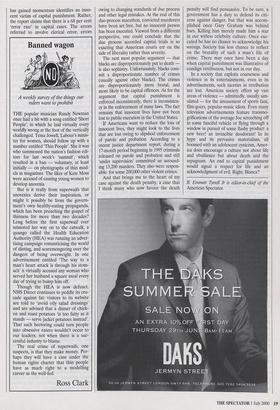Banned wagon
A weekly survey of the things our rulers want to prohibit THE popular musician Randy Newman once had a hit with a song entitled 'Short People', in which he laid virtually every worldly wrong at the foot of the vertically challenged. Tessa Jowell, Labour's minis- ter for women, should follow up with a number entitled 'Thin People'. She it was who summoned the nation's fashion edi- tors for last week's 'summit', which resulted in a ban — voluntary, at least initially — on photographs of thin mod- els in magazines. The likes of Kate Moss were accused of causing young women to develop anorexia.
But is it really from superwaifs that anorexics derive their inspiration, or might it possibly be from the govern- ment's own healthy-eating propaganda, which has been preaching the gospel of thinness for more than two decades? Long before the first superwaif ever scissored her way on to the catwalk, a quango called the Health Education Authority (HEA) was running an adver- tising campaign romanticising the world of dieting, and scaremongering over the dangers of being overweight. In one advertisement entitled 'The way to a man's heart attack is through his stom- ach' it virtually accused any woman who served her husband a square meal every day of trying to bump him off.
Though the HEA is now defunct, NHS Direct continues to peddle its cru- sade against fat: visitors to its website are told to 'avoid oily salad dressings' and are advised that a dinner of chick- en and roast potatoes 'is too fatty as it stands — serve jacket potatoes instead'. That such hectoring could turn people into obsessive eaters wouldn't occur to our leaders; not when there is a suc- cessful industry to blame.
The real crime of superwaifs, one suspects, is that they make money. Per- haps they will have a case under the human rights charter that thin people have as much right to a modelling career as the well-fed.
Ross Clark


























































 Previous page
Previous page